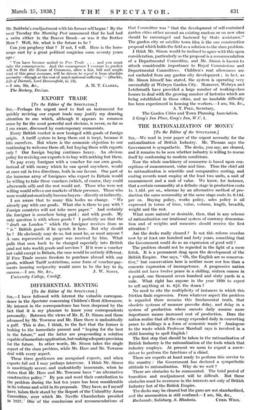THE RATIONALIZATION OF MONEY
[To the Editor of the SPECTATOR.] Srn,—We read in your paper of the urgent necessity for the rationalization of British Industry. Mr. Thomas says the Government is sympathetic. The decks, you say, are cleared, and it remains to be seen whether industry is willing to rescue itself by conforming to modern conditions.
Now the whole machinery of commerce is based upon con- ceptions of measurement, value and time. Thus the chief aid to rationalization is scientific and comparative costing, and costing records must employ at the least two units, a unit of measurement and a unit of value. We know, for instance, that a certain commodity at a definite stage in production costs is. 1.45d. per oz., whereas by an alternative method of pro- duction the same commodity at the same stage costs ls. 0.14d. per oz. Buying policy, works policy, sales policy is all expressed in terms of time, value, volume, length, breadth, weight and the rest.
What more natural or desirable, then, that in any scheme of rationalization our irrational system of currency denomina- tion and of weights and measures should receive the first attention ?
Are the decks really cleared ? Is not this reform overdue now by at least one hundred and forty years, something that the Government could do as an expression of good will ?
The problem should not be regarded in the light of a mere fetish. It is a permanent drag upon the development of the British Empire. One says, " Oh, the English are so conserva- tive," but conservatism here is neither more nor less than a concrete expression of incompetence. A progressive nation should not have twelve pence in a shilling, sixteen ounces in a pound, one thousand seven hundred and sixty yards in a mile. What right has anyone in the year 1930 to expect to sell anything at 4s. Sid. the dozen ?
No need to cite the multiplicity of instances in which this friction finds expression. From whatever aspect the problem is regarded there remains this fundamental truth, that obsolete systems of measure provoke delay, and delay in a system of production where oncosts daily assume more importance means increased cost of production. Does the nation realize that all the energy expended daily in converting pence to shillings is a form of economic waste ? Analogous to the waste which Professor Marshall says is involved in a child learning to spell English !
The first step that should be taken in the rationalization of British Industry is the rationalization of the tools which that industry employs. At present we seem to expect a screw- driver to perform the functions of a chisel.
• There are experts at hand ready to perform this service to the country : the Government has declared a sympathetic attitude to rationalization. Why do we wait ?
There are obstacles to be surmounted. The brief period of transition and readjustment will be difficult. But these obstacles must be overcome in the interests not only of British Industry but of the British Empire.
The decks may be cleared but the guns are not standardized,
and the ammunition is still confused.—I am, Sir, &c., • Rocksands, Salisbury, S. Rhodesia. CYRIL WIC*.




















































 Previous page
Previous page